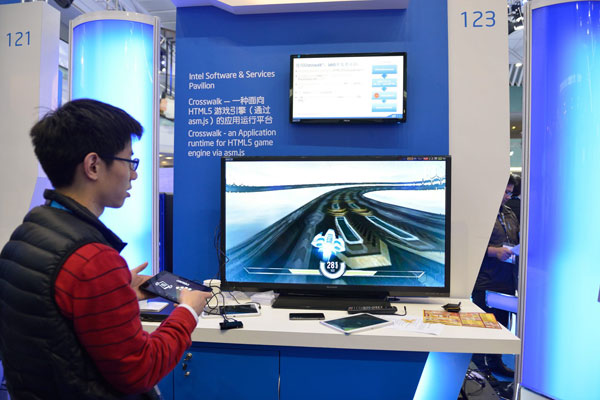 |
|
An employee displays how to remote control the game platform with a tablet computer at the 2014 Intel Developer Forum in Shenzhen, Guangdong province, in April last year.[Photo provided to China Daily] |
Although Intel Corp is the world's leading maker of chips for PCs and servers, the company has long struggled to land a significant piece of the mobile market, where Qualcomm Inc dominates.
Last year, Intel took in 55.9 billion in revenue, up 6 percent from the previous year; its mobile division accounted for 202 million.
It may well be too late for Intel to catch up in the United States or Europe, where just about everyone who is going to buy a smartphone or tablet already has one with a rival chip inside. So instead of battling for the next iPhone contract, the company is pouring billions of dollars into expanding its influence in China, where fewer than half the country's roughly 500 million mobile phone users have smartphones.
Intel, which does not break out mobile earnings figures for China, has a long way to go before it is a serious force in the country's mobile market.
Qualcomm chips are in most high-end phones, including those from Chinese leader Xiaomi Corp, the privately owned Chinese electronics company in Beijing.
Xiaomi, and Taiwan-based MediaTek Inc control the cheaper end of the market. At this point, the chip market in China is a duopoly, said Mark Hung, an analyst at researcher Gartner. Even if Intel reaches third place, "No 3 is probably meaningless."
Nevertheless, Intel has in fits and starts tried to use its relationship with PC clients in China to nose its way into mobile devices over the past few years.
The company supplies chips for Chinese-owned Lenovo Group Ltd, the No 1 global PC seller, and its hardware powers a handful of Lenovo smartphones.
Intel's partnership with Chinese Internet giant Tencent Holdings Ltd, which includes a joint research center, helps ensure that the WeChat maker's software works smoothly with Intel chips, said Rupal Shah Hollenbeck, Intel's general manager for China.
"A lot of basic relationships have started in the area of software and services."
Intel paid $1.5 billion in September for a 20 percent stake in Tsinghua Unigroup Ltd - an operating subsidiary of Tsinghua Holdings Co Ltd, a State-owned limited liability corporation funded by Tsinghua University - which controls two domestic mobile chipmakers.
